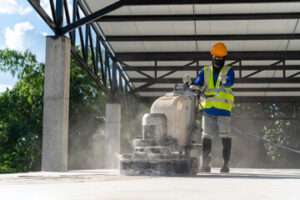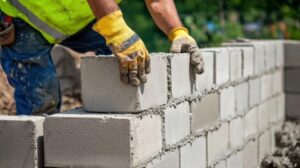Commercial concrete contractors specialize in handling all aspects of concrete construction. They work closely with architects and engineers to create functional, aesthetically-pleasing structures. They interpret blueprints and drawings to determine specifications and requirements.

They also repair and maintain existing concrete surfaces. Hiring Concrete Contractors Greensboro NC will ensure that your project stays on schedule and within budget.
Professional concrete contractors know how to effectively plan and execute construction projects in accordance with local codes and standards. They also understand the importance of fostering positive client relationships, which helps them build long-term business sustainability. Choosing the right contractor for your project is vital, and factors to consider include experience, reputation, reliability, attention to detail, communication skills, and quality assurance protocols.
Professional contractors offer high-quality results and cost savings in the long run. They use premium-quality materials and implement proven techniques that result in durable structures with minimal maintenance requirements. They also adhere to local building codes, minimizing the risk of fines and delays. This ensures the safety of all residents and reduces the possibility of future structural issues.
Concrete contractors possess extensive industry knowledge and experience from hundreds or thousands of projects. They are able to anticipate the needs of their clients and deliver quality results that exceed expectations. They also take into account the specifics of each job site, including weather conditions and any potential challenges. This prevents delays and misunderstandings and ensures a successful project completion.
They are dedicated to the well-being of their employees and clients. They regularly conduct risk assessments and implement safety protocols. They also encourage their teams to report any unsafe conditions or practices and promote a strong culture of accountability and responsibility. In addition, they prioritize environmental sustainability and implement eco-friendly processes in their work.
Choosing the right concrete contractor can make or break your project’s success. Make sure to ask about their experience, reputation, and reliability, and look for a contract that clearly defines project details, timelines, costs, and warranties. You should also inquire about their equipment and whether it is properly maintained.
A good concrete contractor should be able to provide references and examples of their previous work. It’s also important to request estimates from multiple contractors for comparison. A reputable contractor will provide a detailed quote that includes a breakdown of material costs, labor, and equipment. Beware of contractors who don’t provide estimates or give vague totals without explanation, as this may indicate subpar materials or hidden fees.
Experience
Concrete Contractors are experts in the construction of a wide range of concrete structures and surfaces. They use their skills and experience to ensure that the concrete meets design specifications, complies with industry standards, and is finished on time and within budget. They also work with other professionals to achieve project goals, including architects, engineers, and clients. A contractor’s experience will help them identify and address potential challenges before they arise.
When selecting a concrete contractor for your next project, it’s important to ask them about their previous work and projects. Look for contractors with a strong track record of quality work and an impressive portfolio of transformations. You can find out more about their experience by asking for references or reviewing their online reviews. You should also inquire about the types of equipment they use and how often they maintain them. A well-maintained machine will operate more efficiently and reduce the risk of unexpected breakdowns that can slow down production.
It is also important to ask contractors about their payment schedules. This helps you manage cash flow and ensures transparency in your financial dealings. Also, inquire about any hidden fees that may be included in the final price. Inquiring about these aspects helps you avoid misunderstandings and aligns expectations for both parties.
A reputable concrete contractor should be confident in their abilities and be willing to provide you with client testimonials. This feedback will help you determine whether they are the right fit for your project. You should also ask about their warranty policy and what happens if you are dissatisfied with their work.
Finally, you should ask contractors about their safety practices and protocols. Choosing a contractor that is dedicated to safety is essential for ensuring the safety of everyone on the job site.
An experienced concrete contractor should be able to meet the requirements of your project, no matter how complex or complicated it is. During the selection process, consider the scope of your project, the timeline, and any other relevant factors to make an informed decision. You should also consider the quality of materials used and their durability. A good contractor should be able to provide you with a detailed estimate for the entire project.
Reliability
When selecting a concrete contractor, it is important to find one who has experience with the type of project you are working on. Look for a portfolio of projects completed by the company, and request references from past clients. This will give you an idea of the quality of work the contractor can produce. You may also want to ask the contractor about his/her insurance coverage. This will protect you from liability in case of accidents or damage to property during the construction process.
A reputable concrete contractor will prioritize quality and safety, and adhere to industry standards. They will use best practices when building projects, and prioritize open communication with clients. They will also be committed to completing the project in a timely manner.
Choosing a concrete contractor for your next home improvement project can be overwhelming. Whether you are in need of a new foundation, sidewalk, driveway, or patio, finding the right contractor is critical to ensuring your project is successful. By taking the time to do your research, you can ensure that you choose a dependable professional who will complete your project to your satisfaction.
A reliable concrete contractor will be licensed and insured, which will help to protect you from potential liabilities. Before hiring a contractor, check their license with your local government and read online reviews. It is also a good idea to ask friends and family for referrals. When you find a few contractors that meet your criteria, ask them for estimates. Choose a contractor who provides a detailed breakdown of costs, including materials, labor, equipment, and permits.
In addition to being licensed and insured, a reputable concrete contractor will have a positive reputation in the community. They will have a solid track record of providing high-quality services and products at competitive prices. In addition, they will have the resources and expertise necessary to manage large-scale commercial concrete projects. To ensure that you are hiring a reliable contractor, ask for references from previous clients and verify their insurance coverage. If you are unable to obtain any references, check the contractor’s reputation on sites such as Angie’s List and HomeAdvisor.
Communication skills
Concrete contractors are specialized professionals who are experts at mixing, pouring, and finishing concrete to create structures that are long-lasting and durable. They use their skills and expertise to construct everything from foundations, sidewalks, patios, and driveways to concrete infrastructure projects like bridges, tunnels, dams, and highways. They also provide maintenance and repair services to prolong the lifespan of concrete structures.
When choosing a concrete contractor, it is important to consider their experience, reputation, attention to detail, and communication skills. These qualities will ensure a smooth construction project and a quality result. The right contractor will be able to answer your questions and concerns clearly, explain technical details in a way that is easy to understand, and keep you updated throughout the construction process.
During the initial consultation, ask prospective concrete contractors how they will manage your project timeline and budget. Look for transparent pricing that includes all labor, material, and other associated costs. Also, discuss whether the contractor offers any do-it-yourself (DIY) options, such as concrete cutting, which can save you money while delivering professional results.
Additionally, ask for references and contact information from previous clients. Call or email these references to inquire about their experience working with the contractor, including their communication skills, project timelines, and overall satisfaction with the results.
Concrete work is a time-consuming and complex task, so it is important to hire a contractor with excellent communication skills. A good contractor will be able to outline the project timeline and communicate any potential hurdles upfront so that you can make an informed decision about your needs and expectations.
Additionally, a good contractor will be able to adapt to unforeseen circumstances during the course of your project. They will be able to find creative solutions that maintain the integrity of your construction while staying within your specified budget. They will also be able to collaborate with your team and share insights that can promote innovation and efficiency. Lastly, a good contractor will prioritize safety and take precautions to prevent injuries or property damage on the job site. This will benefit both you and the contractor by minimizing delays and reducing costly mistakes.

